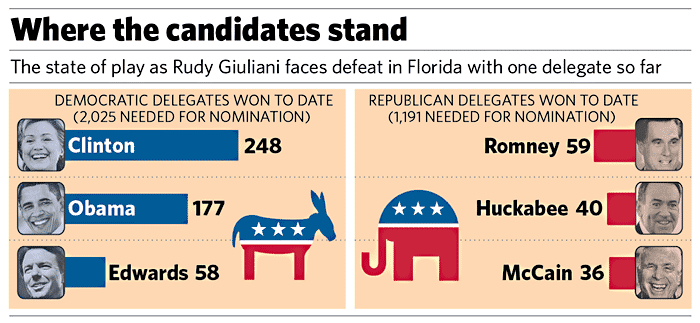State could still play controversial role in choice of Democrat candidate

Democrats flooded Florida's polling stations to choose their presidential nominee, despite the possibility their votes will count for nothing.
While, for Republicans, yesterday's voting was entirely consequential with the likelihood that the Sunshine State would narrow the field down to just two final contenders, Democrats found themselves participating in a vote with little official meaning.
Yet maybe they know better: that with both candidates scrambling for delegates, the "non-vote" in Florida may matter yet, especially if Hillary Clinton, who came out on top, gets her way.
This is the mess left behind by Florida's decision to defy rules set by both parties and shift its primary date forward with the intention of placing itself among the earliest primary states and enhancing its importance in the primary process. They got their way – sort of.
The Republicans responded by halving the number of delegates that Florida can send to the party's nominating convention in the summer.
But the Democrats decreed that no Florida delegates at all would attend its convention. All the candidates then agreed not to campaign in the state.
Democrats here, deprived of the opportunity to participate, feel aggrieved, but it has not stopped them voting. More than 400,000 Democrats had taken advantage of Florida's early-voting arrangements by the end of the weekend.
"I'm disappointed that my vote is a vote that, in essence, doesn't count but I feel that Florida will have an effect on the rest of the country," said Judith Lamet after casting her vote – for Barack Obama.
Mrs Clinton was helped in Florida by the state's large contingent of Hispanic voters, who remain cool to Mr Obama. And she intends to send the message that winning the state is more than symbolic. Hence her dash to southern Florida last night when so much campaigning needed to be done elsewhere ahead of the near-national primary next Tuesday.
She was hoping not only to reclaim some media shine in the wake of her lopsided defeat to Mr Obama in South Carolina at the weekend but to address other, possibly more complicated, motives. Some observers doubt if the party will bar delegates from Florida attending their convention. Indeed, the Clinton camp has made plain it intends to request they be seated.
This could all prove crucial, and dangerously contentious, as many anticipate that, for the first time in modern political history, the Democrat nominee will not emerge by national acclaim but instead, because the contest looks so tight, with an old-fashioned battle for delegate numbers.
The nomination will go to whoever amasses 2,025 delegates first. Mrs Clinton has a slight edge with 248 earned in primaries so far against 177 for Mr Obama. The stakes are huge next Tuesday when about 1,700 delegations will be awarded.
Meanwhile, John Edwards, though trailing in each primary, is still gathering delegates and so he could play king-maker at the convention. Muddying matters further are 800 so-called "super-delegates" who will be at the convention, most of them elected Democrats and party grandees. Some have already been attributed.
If the Democrat candidates' delegate counts come out anything close to equal at convention time, the potential for legal warfare between the two last standing will be huge. And especially so, if Mrs Clinton attempts to seat delegates from Michigan and Florida and count them as her own.
Subscribe to Independent Premium to bookmark this article
Want to bookmark your favourite articles and stories to read or reference later? Start your Independent Premium subscription today.

Join our commenting forum
Join thought-provoking conversations, follow other Independent readers and see their replies